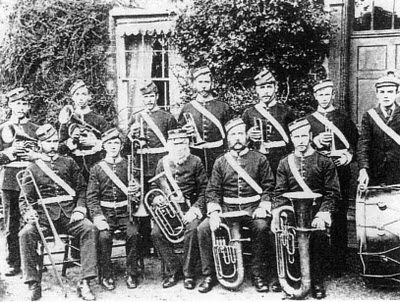Battalion Bandmasters
George Hatfield joined the Kings Own Rifle Corps in 1855, aged 12, following in his father’s footsteps. He served with that regiment for 20 years and became a Band Sergeant. He was then Bandmaster of the First Battalion West Yorkshire regiment until 1893. Following this he was Bandmaster of the Princess Beatrice Isle of Wight Rifles until being pensioned not long before his death in 1898. He was aged 55. His obituary in the County Press stated he had been ill for some time and described him as a quiet gentlemanly officer who had done good service in all the corps with which he had been connected. The funeral took place, with military honours, at Ryde Cemetery on a Sunday afternoon. This day was selected to enable members of the Volunteers who could not attend on other days to be present and pay a last tribute of respect to an esteemed comrade. George’s headstone lists his military and musical career and states, “This stone was erected by his comrades in token of their sincere regard.”
In Victorian times it was not unusual for a new military recruit to be very young and like George, join the same regiment as his father, who also happened to be a band master. We might wonder if George’s interest in music started at that early age too and perhaps he had been a drummer boy.
Historically, military bands were funded by the officers of the regiment (a situation that continued into the 1870s). A regimental band functioned just as much as the officers’ private band, as it did as an element of military ritual and ceremonials. A significant part of its purpose was to play music for the officers’ entertainment in the Mess, and to perform at balls and concerts. There is plenty of evidence in surviving printed music and in newspaper reports of the period of the kind of music that they played – ‘favourite airs and marches’, ‘reels and country dances’, quadrilles and ‘selections’ from the operatic and classical repertoires being typical.
In 1892, the year before George came to the Island, another Bandmaster of the Princess Beatrice Regiment, was advertising music tuition in the Isle of Wight Observer, in his spare time!
Mr A Cooke, Bandmaster 5th (IW) Princess Beatrice’s VB Hants Regt., Ryde Detachment (for many years Bandmaster 104th Bengal Fusiliers, also 3rd VB Gordon Highlanders) having a few spare hours daily, can give LESSONS in Instrumental or Vocal music. Beginners carefully studied. Terms moderate. FIRST CLASS STRING BAND for Balls, Evening Parties, &c., REED & STRING BANDS for Promenade Concerts, Garden Parties, &c. Address;
No. 22, Prince Street, Ryde, I.W.
This Mr Robert Arkley Cooke is buried in Ryde Cemetery and has been extensively researched. After retirement from the army he was bandmaster of the Ryde Town Band for many years. Interestingly one of his sons, Robert Arkley Cooke Junior was also a bandmaster, with the 2nd Battalion Middlesex Regiment.
Sources:
IW County Press 12 November 1898; IW Observer 25 June 1892; www.opwn.ac.uk Diary of a Victorian military bandsman
Photo image: www.ivan-making music.blogspot.co.uk – typical unknown band circa 1880s

